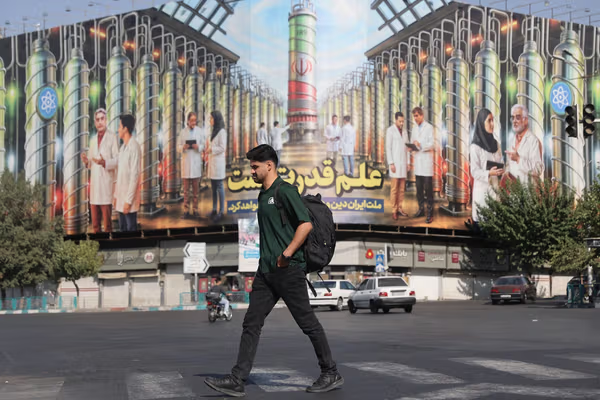
Salutes and anthems: how sports succumbed to Iran's culture war
Iranian athletes competing abroad face conflicting pressures: the state demands public displays of loyalty, while opponents expect defiance.

Iranian athletes competing abroad face conflicting pressures: the state demands public displays of loyalty, while opponents expect defiance.

Iran’s parliament will convene an emergency session on Saturday to review the government’s new cooperation agreement with the International Atomic Energy Agency (IAEA).
Voices are growing in Tehran that warn the ruling system has only a narrow window left to launch reforms essential for its survival.
Ultra-hardliners in Tehran blasted a new nuclear deal struck in Cairo with the UN atomic watchdog, accusing negotiators of bypassing parliament and putting national security at risk.

Iran’s Foreign Minister Abbas Araghchi on Wednesday cast doubt on a potential opening in the nuclear standoff, appearing to undermine the deal he had signed just a day earlier with IAEA Chief Rafael Grossi in Cairo.

An Iranian lawmaker said on Wednesday the country should pursue building a nuclear weapon since it already paid a heavy price for its nuclear activities in a 12-day conflict with Israel and the United States in June.

Pressure on President Masoud Pezeshkian’s government continues to mount despite explicit support from Supreme Leader Ali Khamenei, who this week praised the president and his cabinet during a meeting in Tehran.

Twenty-one official bodies were found responsible for the April explosion at Shahid Rajaee port, southern Iran, that killed 58 people and injured more than 1,500, Iran’s judiciary said on Monday.

A proposal to return control of Iran’s nuclear negotiations to the Supreme National Security Council (SNSC) has highlighted the growing influence of its new chief, Ali Larijani—and a potential readjustment of Tehran’s negotiation strategy as UN sanctions loom.

Several newspapers in Iran have warned that the return of UN sanctions and threats of renewed conflict with Israel could plunge the country into crisis, while also noting that some officials downplay the risks.

The vicious debate over a free concert at Tehran’s most iconic square—and its eventual cancellation—has laid bare not only the rulers’ fear of spontaneous crowds but also deep rifts among Iranians themselves.

A fresh hike in bread prices has deepened the strain on many Iranians, prompting warnings from a prominent economist that unchecked inflation could spark unrest.

The postwar debate over Israeli infiltration of Iran’s security and political system has added another layer to contentions in Tehran, with warnings and accusations directed at some hard-liners and radical insiders.

Iran’s judiciary has forcefully defended a disgraced oil tycoon from accusations by the central bank that he had not paid back his debts after he was convicted in one of the country's biggest ever corruption cases.

New lows once unthinkable in Iran—from assassinations of senior officials to the gutting of air defenses—have already been plumbed, yet Tehran’s rulers remain impervious to these new realities, inviting the prospect of an even harsher reckoning.

A senior cleric’s claim that Iran’s Supreme Leader endorsed new indirect talks with Washington has raised questions about divisions in Tehran, after Ali Khamenei himself appeared to rule out negotiations in a recent speech.

Iran’s new security chief Ali Larijani has appointed a longtime rival as his deputy at the Supreme National Security Council (SNSC), in a sign of potential shifting power dynamics at the apex of power at a delicate moment.

Europe’s move to trigger the so-called snapback mechanism has sparked an online storm in Iran, ranging from despair and anger to calls for war, regime change, and nuclear weapons.

Iran expelled more than 1.8 million undocumented migrants who are mainly Afghans over the past year, an interior ministry official said on Sunday, adding that at least 800,000 more must leave under the government’s removal plan.

A day after three European states triggered a UN mechanism that reimposes international sanctions on Iran, the move appeared to wrongfoot Tehran's establishment despite months of warnings.

Iranian authorities denied reports that Saeed Toosi, a Qur’an reciter accused of sexually abusing underage boys, was shot in the city of Mashhad on Friday.

Iran’s Ministry of Culture and Islamic Guidance has issued a confidential directive to domestic media, instructing outlets to limit coverage of the European move to trigger the UN snapback mechanism and avoid content that could cause public concern or market instability.